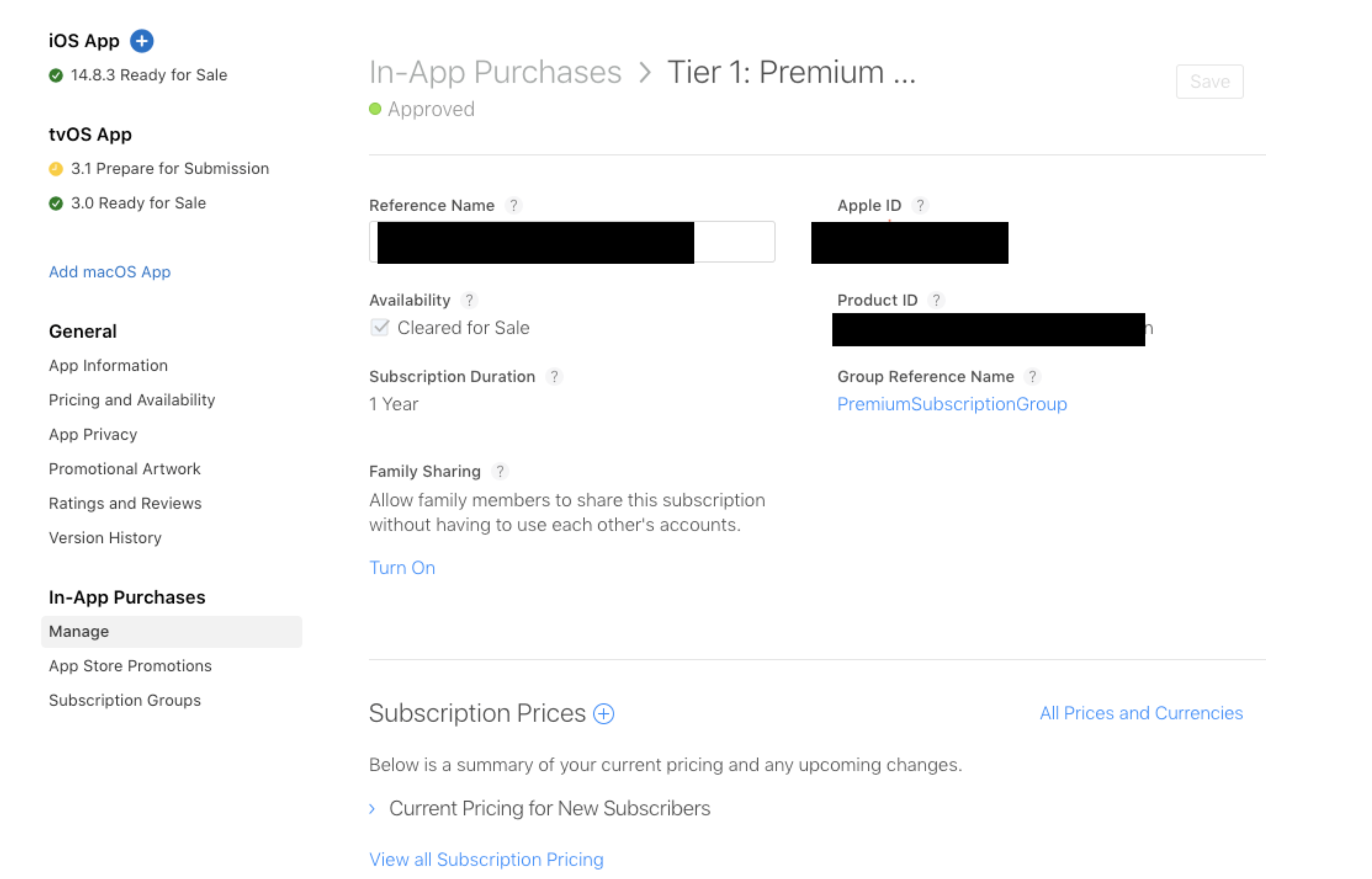AccuWeather meteorologists are available 24/7 to provide further insights and updates on evolving weather conditions. Please contact pr@accuweather.com during regular business hours, or support@accuweather.com or call AccuWeather’s Media Hotline at (814)-235-8710 at any time to arrange interviews with AccuWeather experts or to request the most updated graphics for print or broadcast.
Catastrophic floodingexpected in the Southeast after Debby blasts Florida at landfall
August 5, 2024
business across theSoutheast with ripple effects likely felt nationwide. |
|||
AccuWeather Global Weather Center – August 5, 2024
All-time rainfall records could be shattered in some places by Debby this week as the storm threatens the southeastern United States with life-threatening flooding andstorm surge impacts.
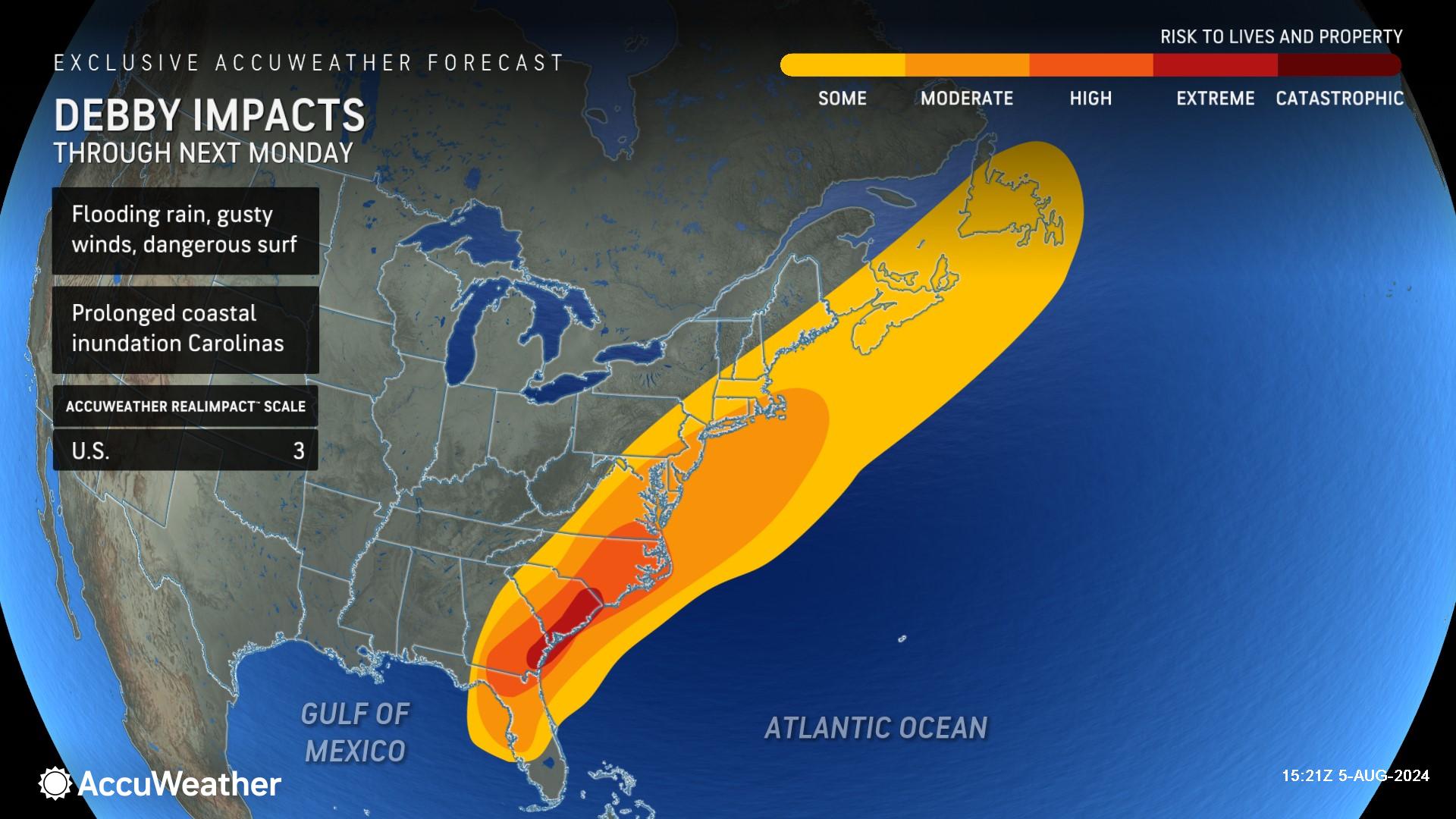
AccuWeather expert meteorologists say there is an extreme risk to lives and property in eastern Georgia, South Carolina and North Carolina.
“Rainfall totals could surpass 30 inches in spots. I’m very concerned theSavannah, Charleston and Myrtle Beach areas that could face catastrophic amounts of rainfall over the next few days, especially if Debby stalls for a longer amount of time than we expect,” said AccuWeather Lead Hurricane Expert Alex DaSilva. “We’re lucky that Debby made landfall on Monday morning. If this hurricane had six or more hours over the warm waters of theGulf, it could have easily strengthened to a Category 2 or even a Category 3 Hurricane on the Saffir-Simpson Hurricane Wind Scale before it made landfall.”
Despite making landfall in Florida on Monday morning, AccuWeather Chief Meteorologist Jon Porter warns that Debby’s impacts will intensify once it reaches the Atlantic Ocean along the southeastern coast of the United States.
“Just as AccuWeather accurately forecast last week, this storm intensified into a hurricane before making landfall in Florida, and unfortunately, we’re just getting started,” said Porter. “We expect that Debby is going to evolve into a major flooding disaster across parts of the Southeast. Please do not let your guard down. The flooding and storm surge risks from Debby far outweigh thewind impacts. We’re facing serious rain and storm surge threats in the coming days.”
Impacts in Florida
Debby hammered the Big Bend region of Florida as it made landfall near Steinhatchee on Monday morning as a Category 1 hurricane on the Saffir-Simpson Hurricane Wind Scale with 80-mph winds.
“We knew this storm would be a late bloomer, but once it reached very warm waters of the eastern Gulf of Mexico, Debby intensified quickly before making landfall,” said AccuWeather Chief On-Air Meteorologist Bernie Rayno.
A storm surge of 6.1 feet was reported in Cedar Key as Debby moved onshore. AccuWeather expert meteorologists say 72-hour rainfall totals of 12-20 inches have been reported across Florida. Wind gusts above 90 mph were also reported in the Big Bend area of Florida on Monday morning.
Debby is the fourth named storm to make landfall in Florida during the month of August since 2020. Idalia made landfall in the Big Bend region in 2023. Katrina slammed Florida in 2005 before causing catastrophic flooding in theNew Orleans area. Charley made landfall in southwestern Florida with major impacts in 2004.
AccuWeather expert meteorologists say Debby could spin up tornadoes andwaterspouts as it crosses Florida andGeorgia and into the Carolinas over thenext 48 hours, mainly to the north and east of where the center tracks.
Unprecedented rainfall and flooding expected in the Southeast
DaSilva said multiple factors will determine how quickly Debby reaches theAtlantic Ocean and how long it lingers along the Southeast coast.
“The Bermuda high off to the east, an area of high pressure over the southern Plains and a dip in the jet stream that is essentially pulling this storm to thenorth are all factors that are steering and dragging Debby to the northeast,” said DaSilva. “That dip in the jet stream is going to leave Debby behind. Thisstorm is expected to slow down or stall along the coast of the Carolinas andunleash tremendous amounts of rainfall in the Southeast over the next few days.”
As AccuWeather expert meteorologists have been warning for days, thegreatest risk to lives and property from Debby is expected later this week as it moves inland across Florida and Georgia before entering the very warm waters of the Atlantic Ocean.
“We’re forecasting some areas to receive 18-24 inches of rainfall with an AccuWeather Local StormMax™ of 32 inches. That much rainfall isapproaching state record rainfall territory from tropical storms or hurricanes in Georgia, South Carolina and North Carolina,” said Porter. “Debby is going to be a tropical storm on the Saffir-Simpson Hurricane Wind Scale when it approaches the Southeast coast, but because of the flooding rainfall, storm surge and coastal inundation threats, Debby is a 3 on theAccuWeather RealImpact™ Scale for Hurricanes.”
Porter says experts at AccuWeather developed theAccuWeather RealImpact™ Scale for Hurricanes for tropical threats like Debby, which pose a much greater rainfall and storm surge threat, compared to wind impacts.
“The Saffir-Simpson Hurricane Wind Scale has a major shortfall. It only includes the wind intensity. Debby is the exact type of storm why our expert meteorologists worked to develop the AccuWeather RealImpact™ Scale for Hurricanes, to help better communicate and describe the overall risks from a tropical storm or hurricane,” said Porter. “AccuWeather includes the wind, flooding rainfall impacts, storm surge threats, as well as the total damage andeconomic loss. The AccuWeather RealImpact™ Scale for Hurricanes is themost holistic view of the risks and safety concerns from tropical storms andhurricanes. We created The AccuWeather RealImpact™ Scale for Hurricanes, so people can be better informed and understand the risks, so they can make better decisions for their families and businesses. It also can help government officials recognize just how severe these situations can become.”
Porter said the flooding rainfall, coastal flooding and storm surge inundation threats from Debby will be widespread and life-threatening, potentiallyreaching catastrophic and historic levels.
“Call or text your friends or family who live in low-lying areas in this extremerisk zone in Georgie and the Carolinas and help them understand the urgency of the flooding threat from Debby,” Porter urged. “Please do not try to drive down flooded roads, putting yourself, your family and emergency responders at risk. Tragically, more than 85 percent of the fatalities that happen in tropical storms and hurricanes are due to the water and flooding.”
DaSilva expects Debby to create rough surf, dangerous rip currents andextensive beach erosion along the Atlantic coastline from northern Florida through the Carolinas and Virginia.
“Slow-moving storms can create big problems from relentless flooding andstorm surge inundation,” said DaSilva. “Constant waves slamming the coast for 48 to 72 hours along the Southeast can take a serious toll on the beaches, bays and inlets. It’s not just the rain we’re worried about. Coastal flooding, storm surge inundation and beach erosion could cause major issues as well as impacts to the roads and buildings that get inundated.”
AccuWeather expert meteorologists say Debby will continue to impact travel on highways and at airports across the Southeast. AccuWeather predicts 1,200 flights to be cancelled on Tuesday and 900 flights to be cancelled on Wednesday across the United States.
Will Debby track along the East coast?
After unleashing flooding rainfall for days across the Southeast, AccuWeather expert meteorologists warn that Debby is expected to move inland over themid-Atlantic before moving back offshore and tracking northeast along theEast coast. There is an increasing risk of at least a couple of inches of rain that could cause some flooding from Maryland to Massachusetts Friday through Sunday.
“This tropical threat could restrengthen this weekend,” warned Rayno. “Southern New England should be prepared for potential impacts from a tropical storm late this week and this weekend.”
Debby is expected to create rough surf and rip currents along the entire East coast throughout the week and into next weekend.
The AccuWeather RealImpact™ Scale for Hurricanes
Debby is rated a 3 on the AccuWeather RealImpact™ Scale for Hurricanes for the United States, which warns of widespread and substantial flooding, structural damage to buildings and mobile homes, as well as downed trees, power outages and major coastal inundation.
In contrast to the Saffir-Simpson Hurricane Wind Scale, which classifies storms by wind speed only, the AccuWeather RealImpact™ Scale is based on a broad range of important factors. In order to better communicate a more comprehensive representation of the potential impact of a storm on lives andlivelihoods, the scale covers not only wind speed, but also flooding rain, storm surge and economic damage and loss. Some of these hazards such as inlandflooding and storm surge in many storms result in more deaths and economic loss than wind.
Porter says Debby eventually might need to be rated a 4 or higher on theAccuWeather RealImpact™ Scale for Hurricanes if it should stall long enough along the southeastern Atlantic coast along the Carolinas.
A 4 on the AccuWeather RealImpact™ Scale for Hurricanes warns of widespread catastrophic flooding that may last days to weeks, widespread power outages, structural damage to many buildings, especially near thecoast, as well as severe coastal inundation.
AccuWeather Forecast Graphics
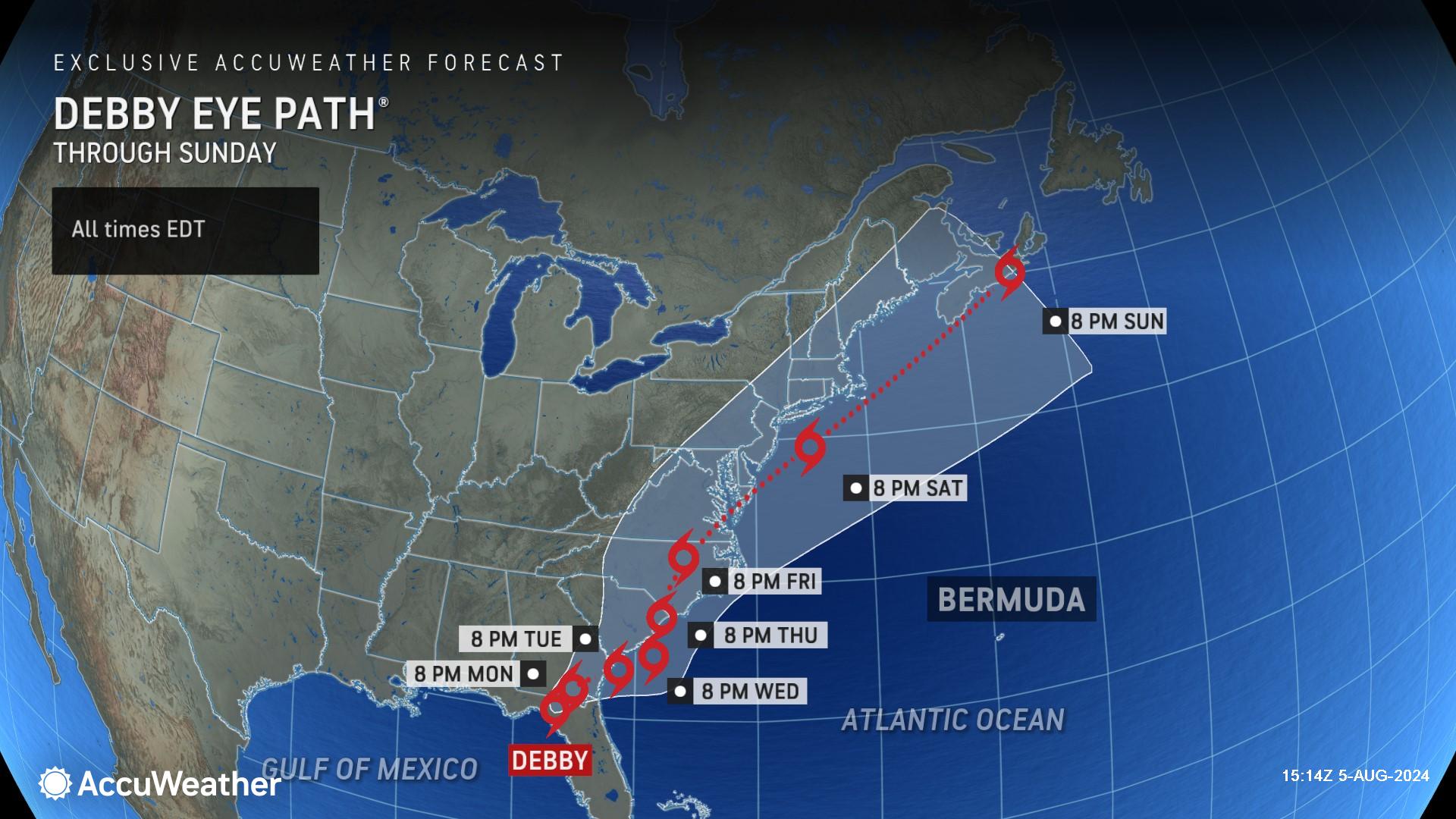
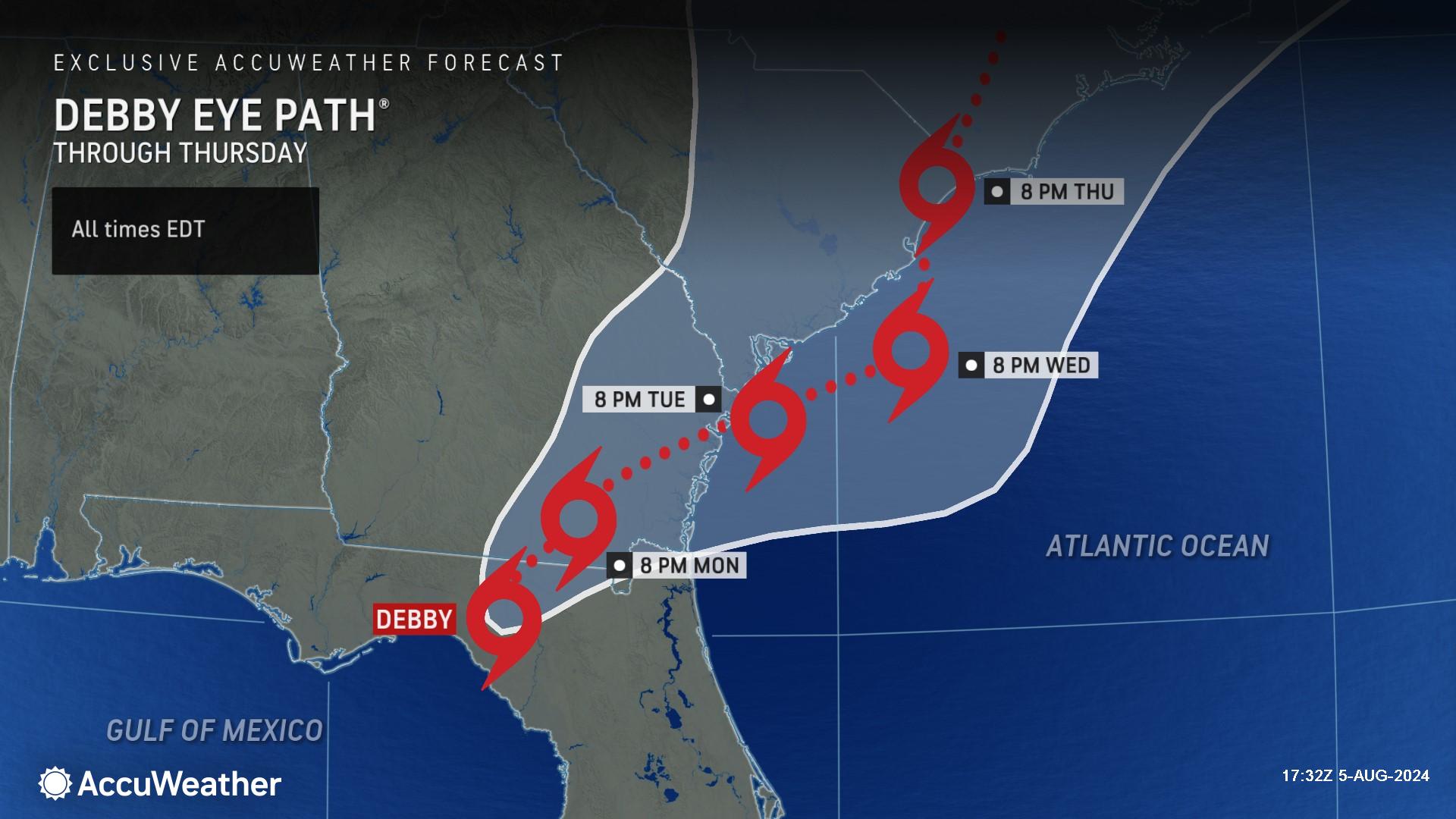
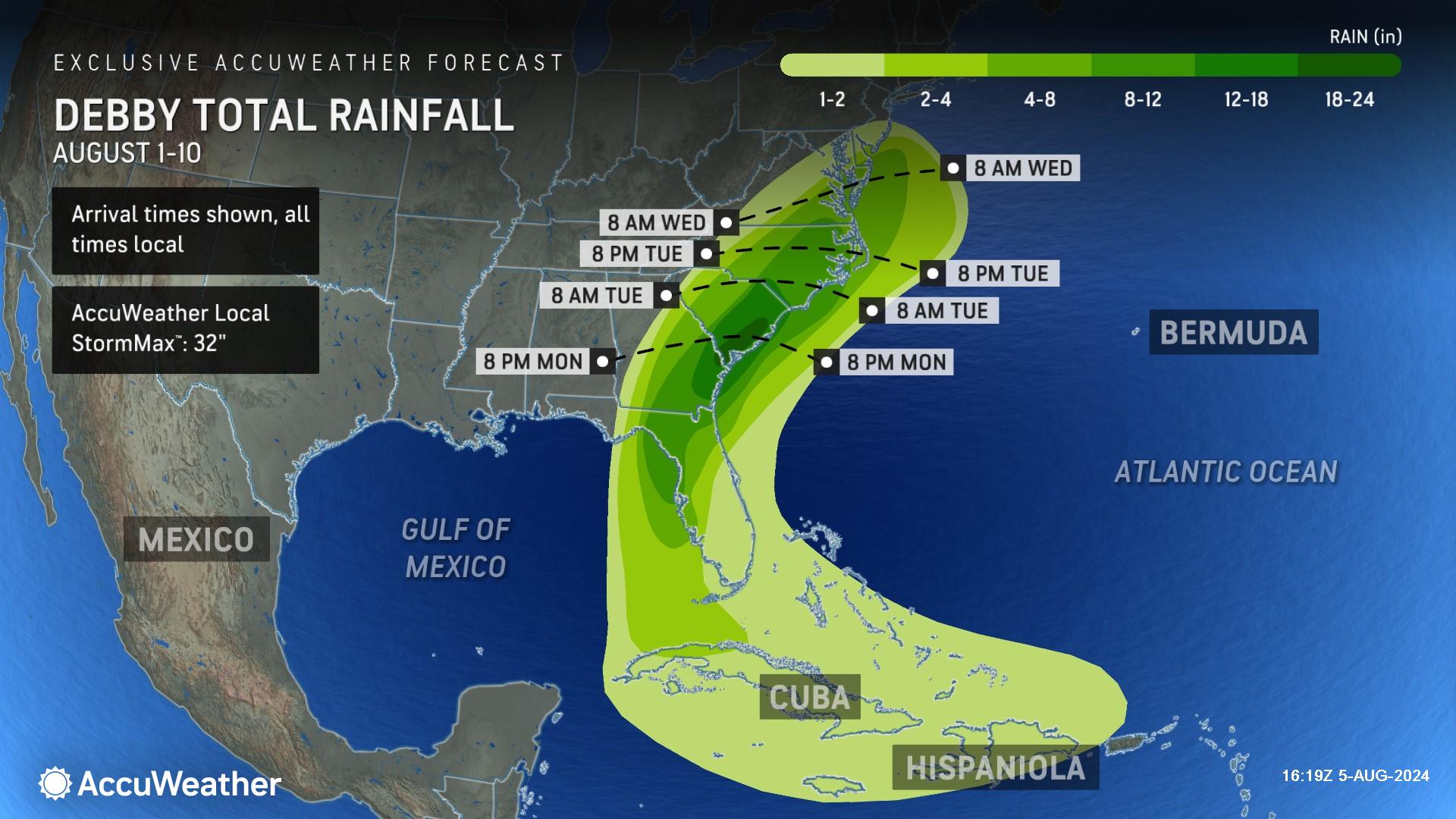
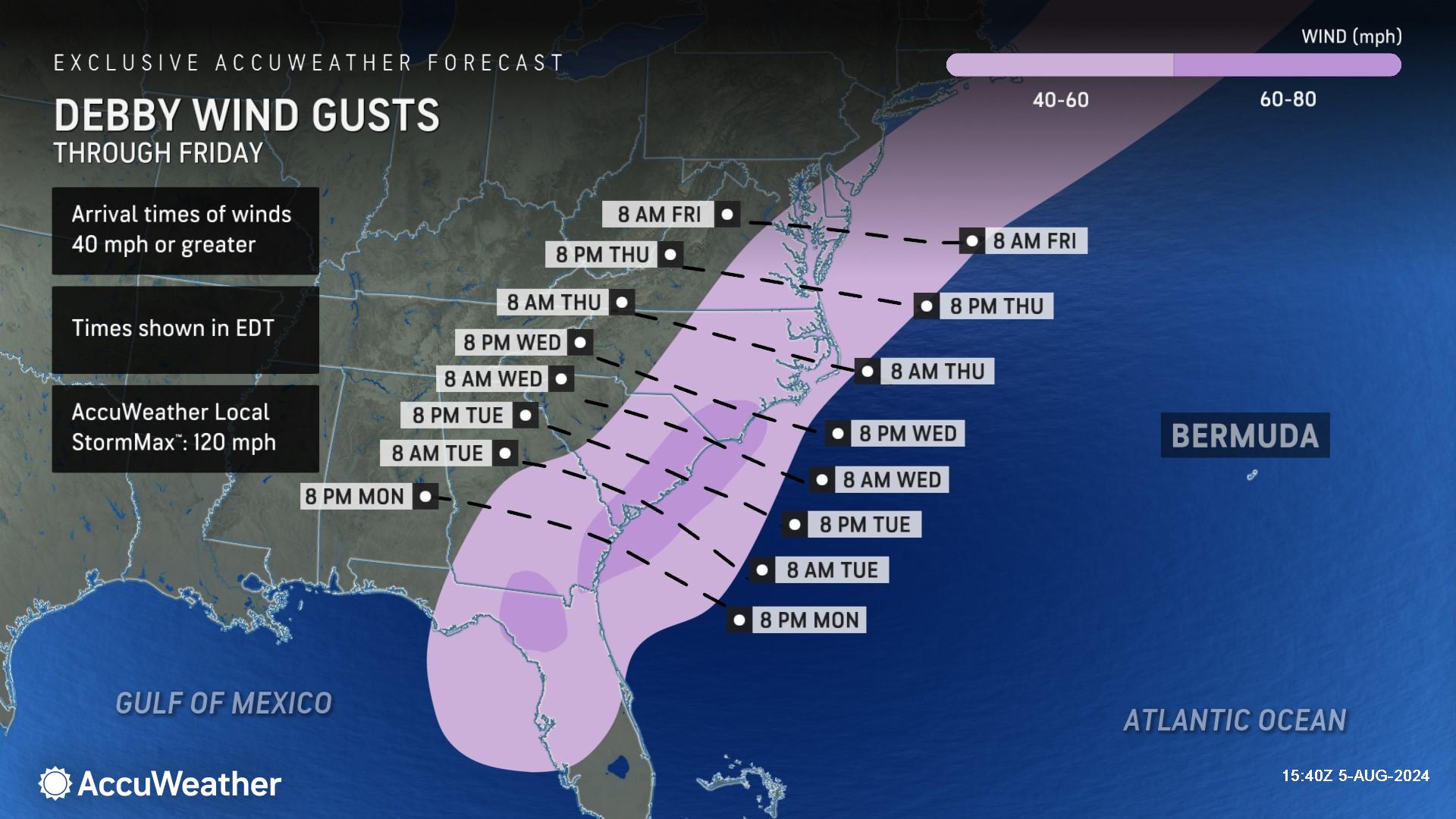
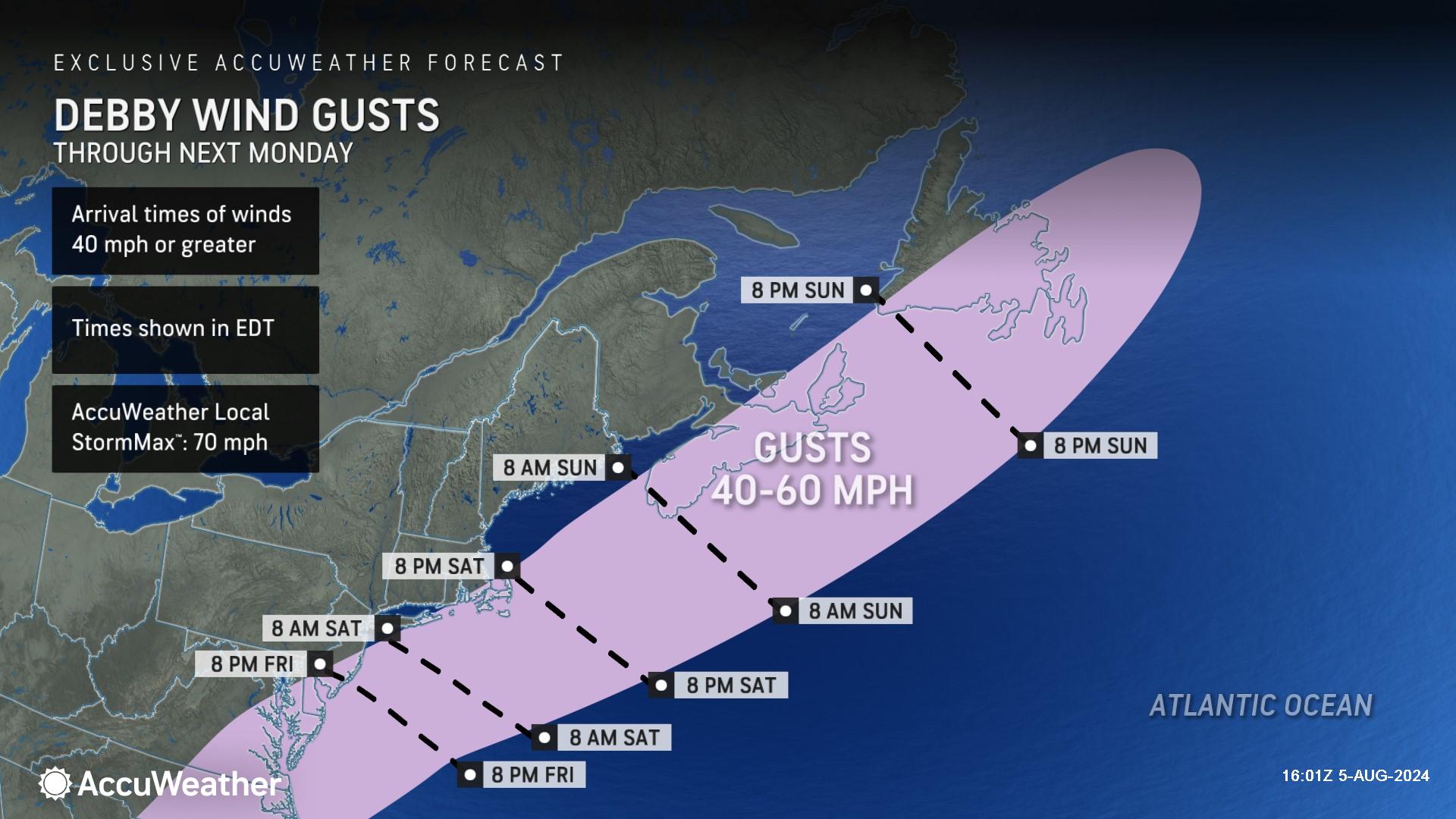
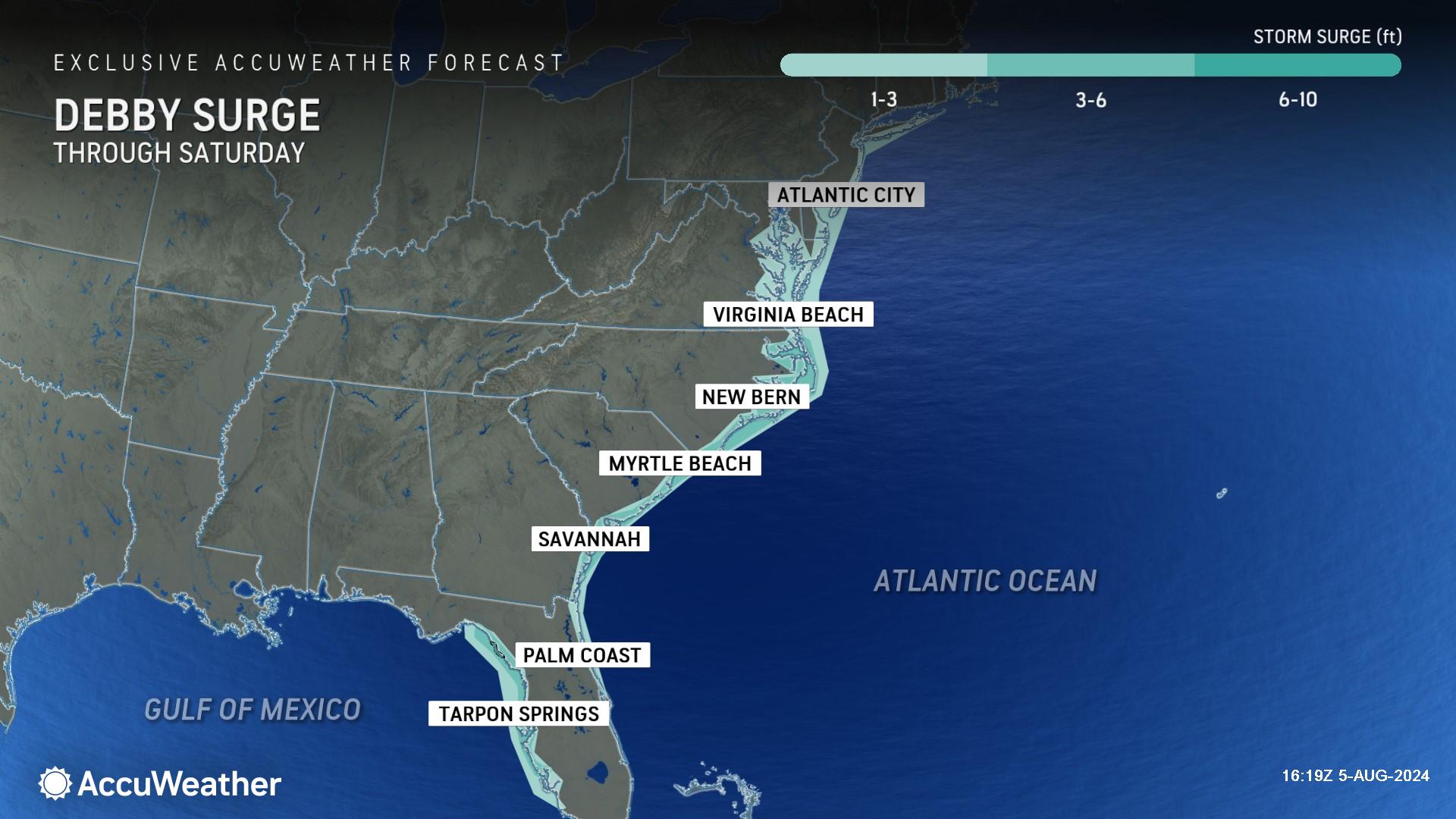
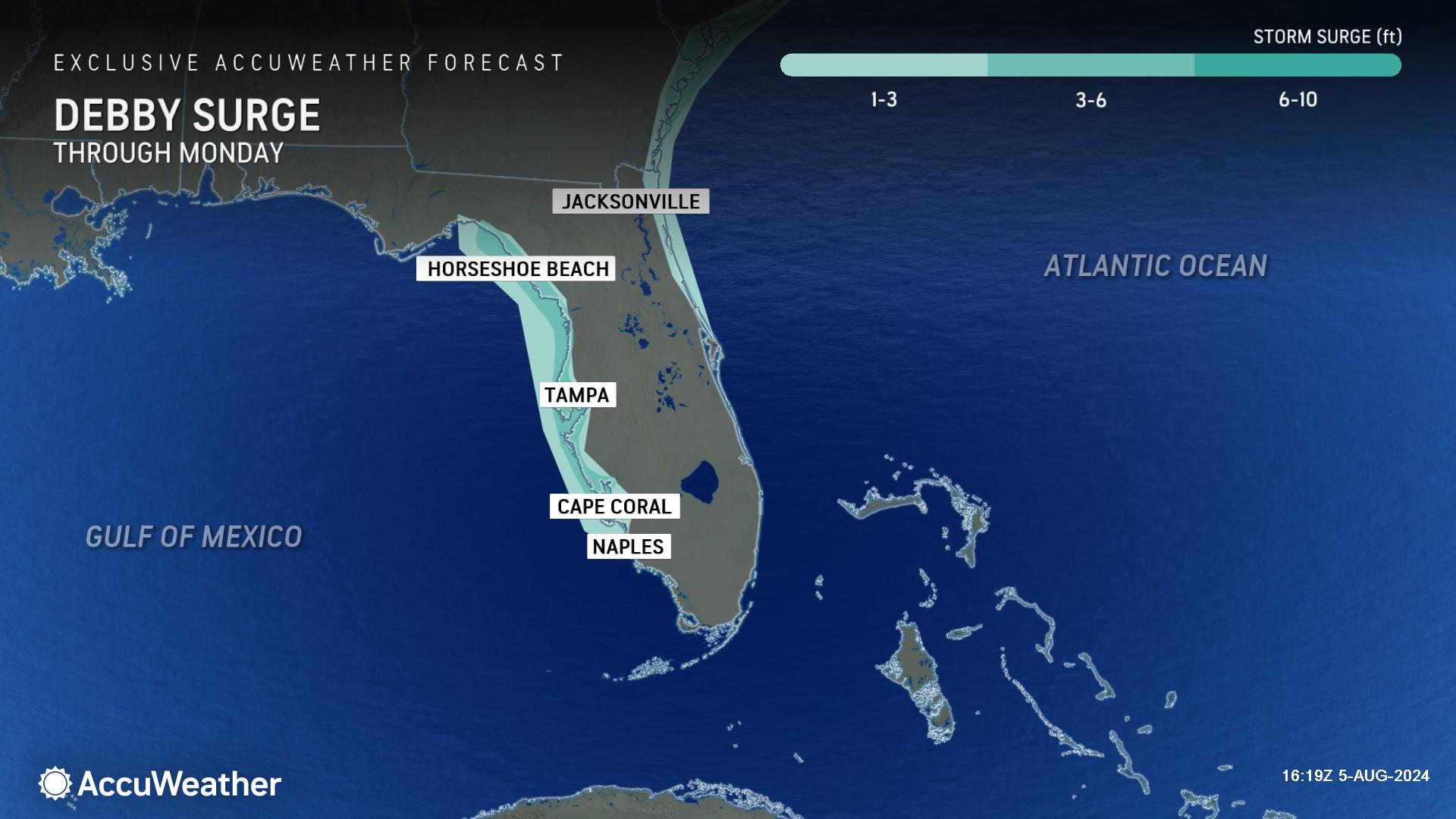
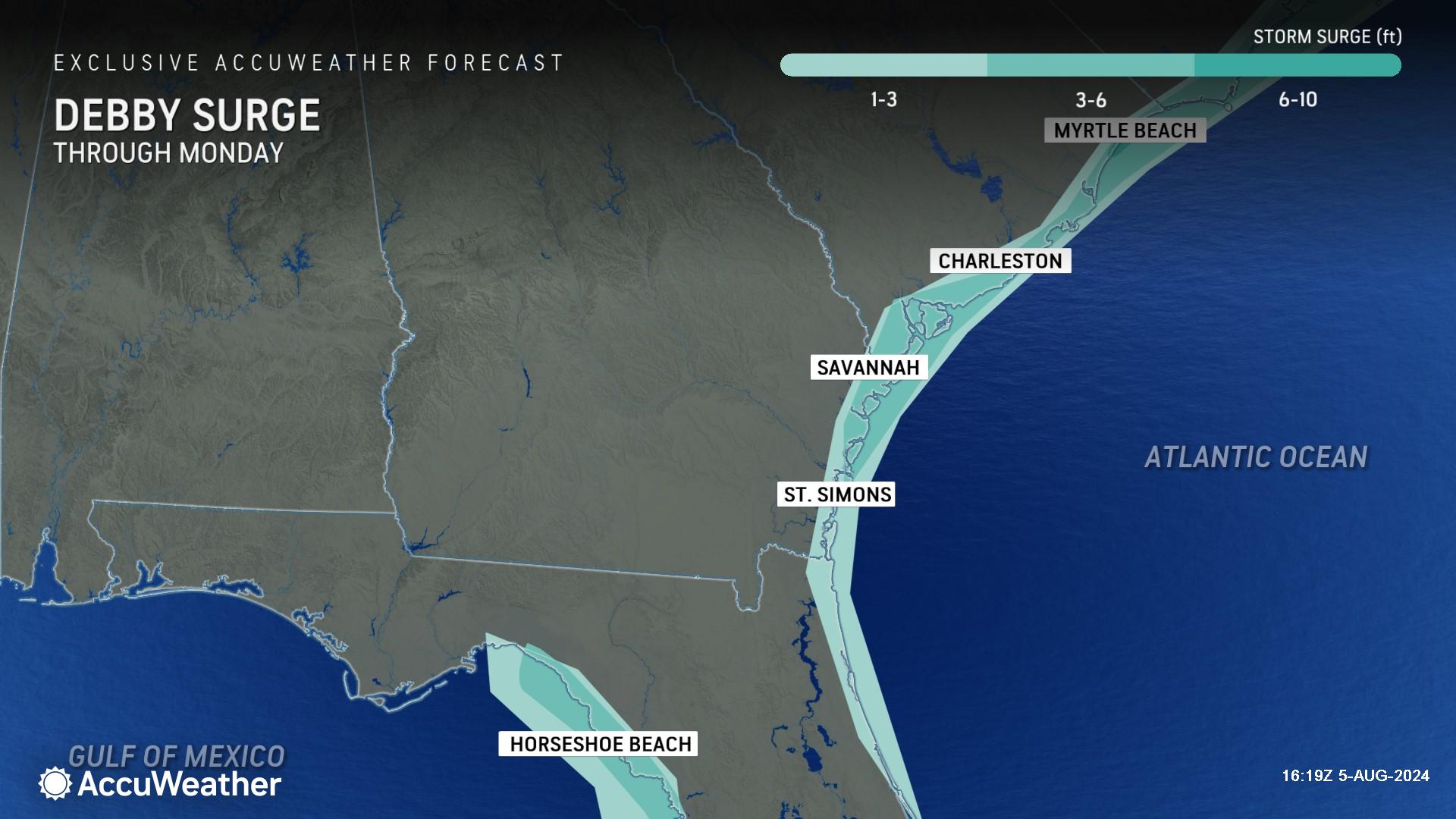
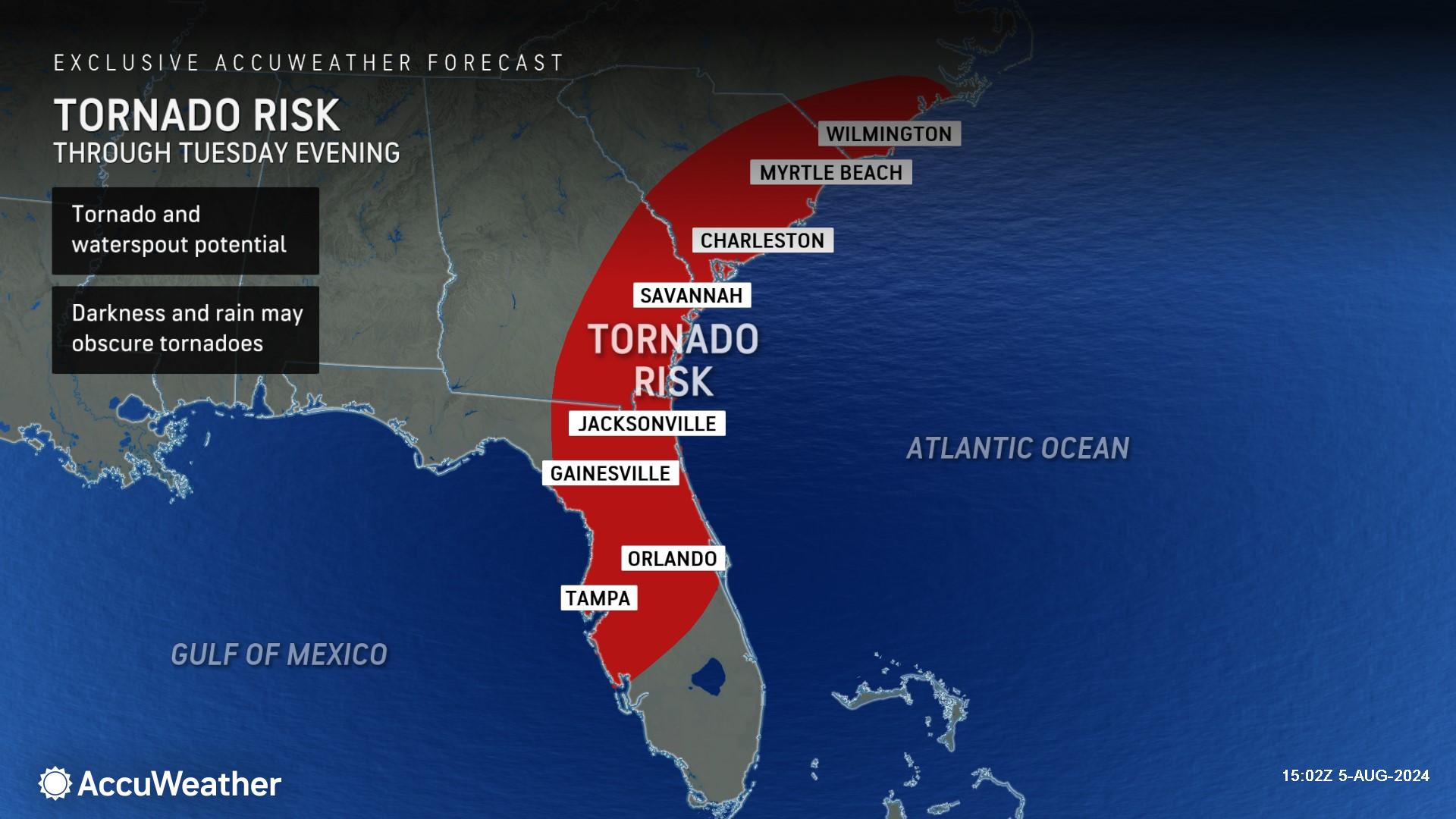
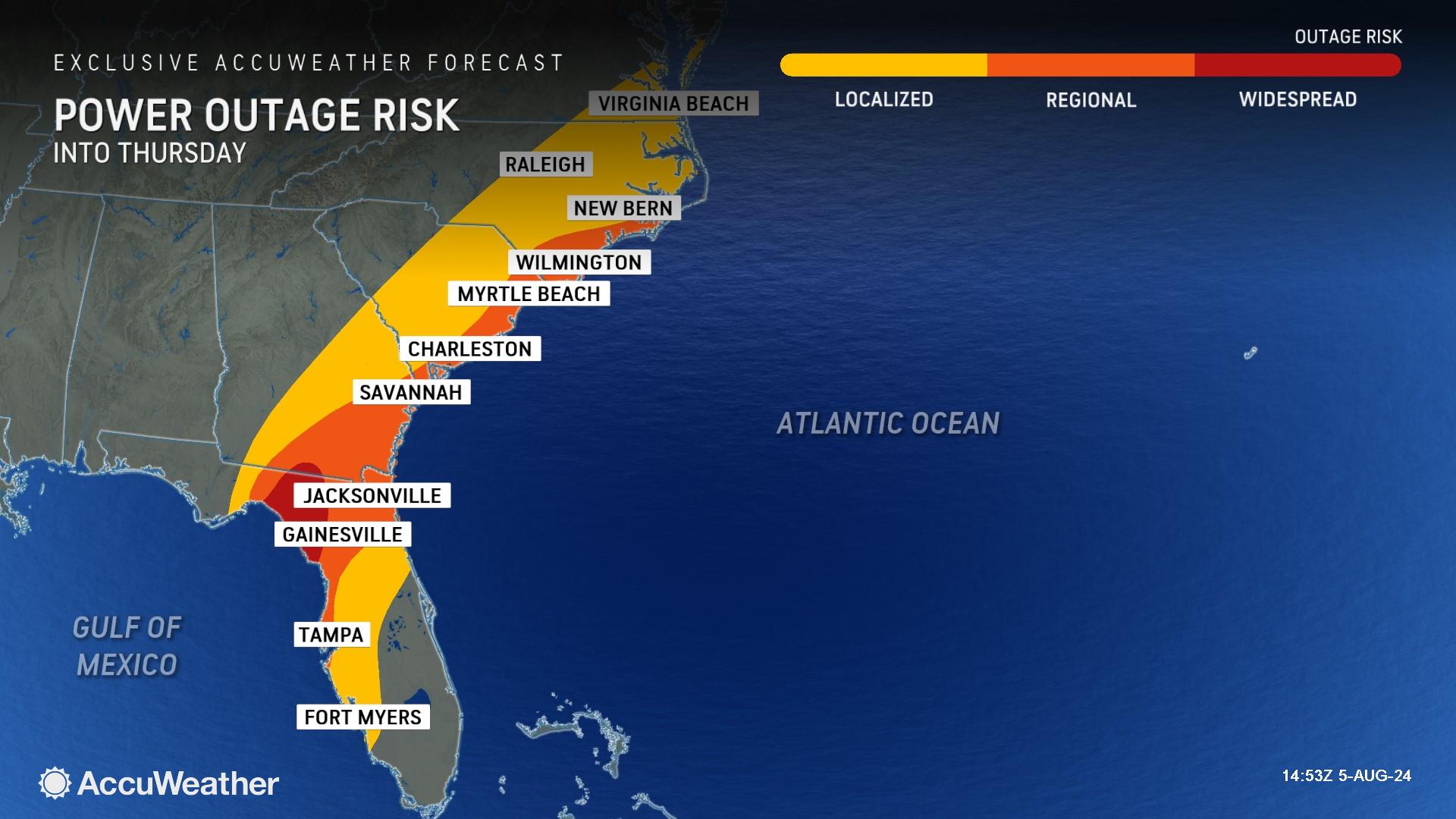
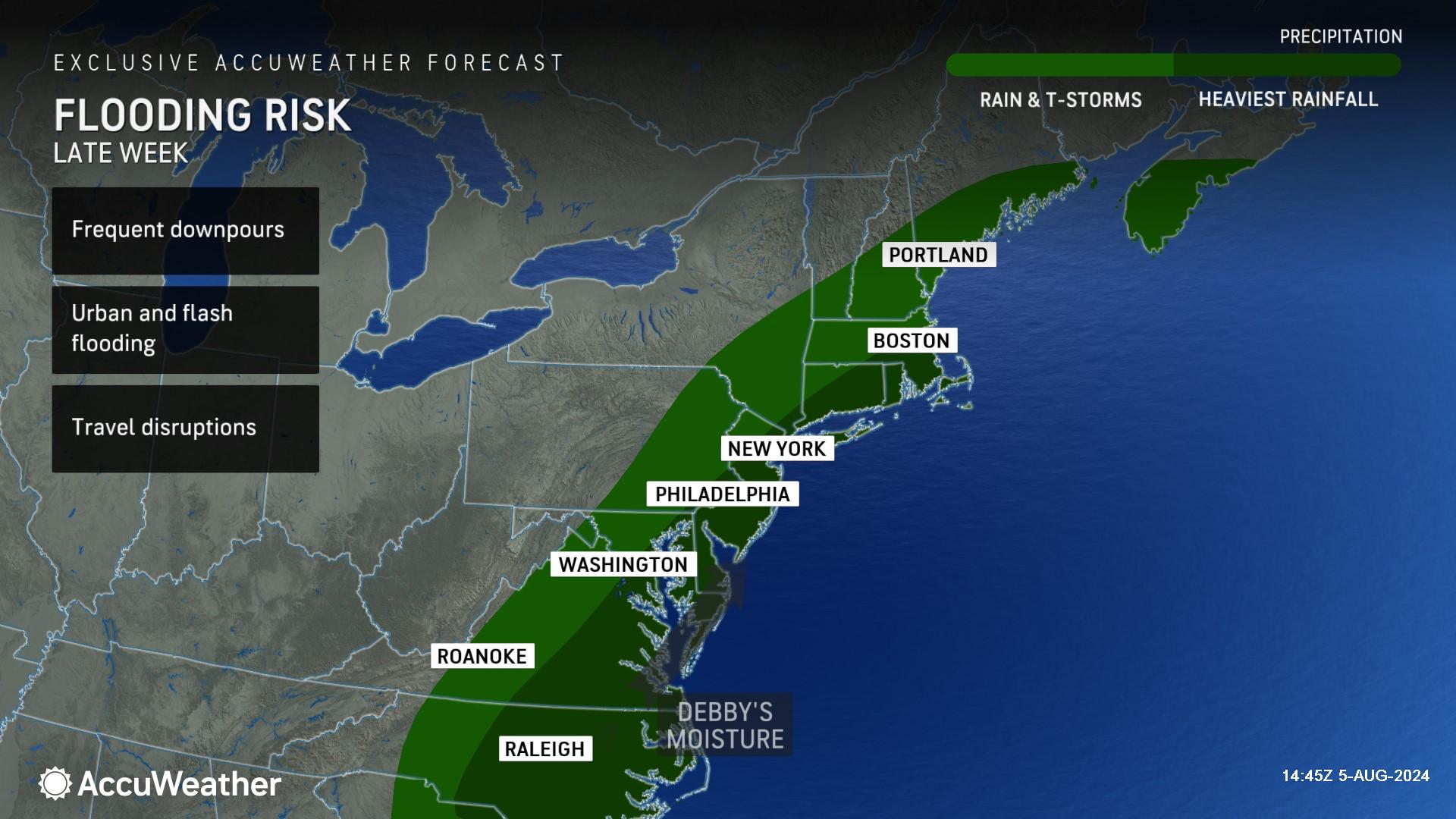
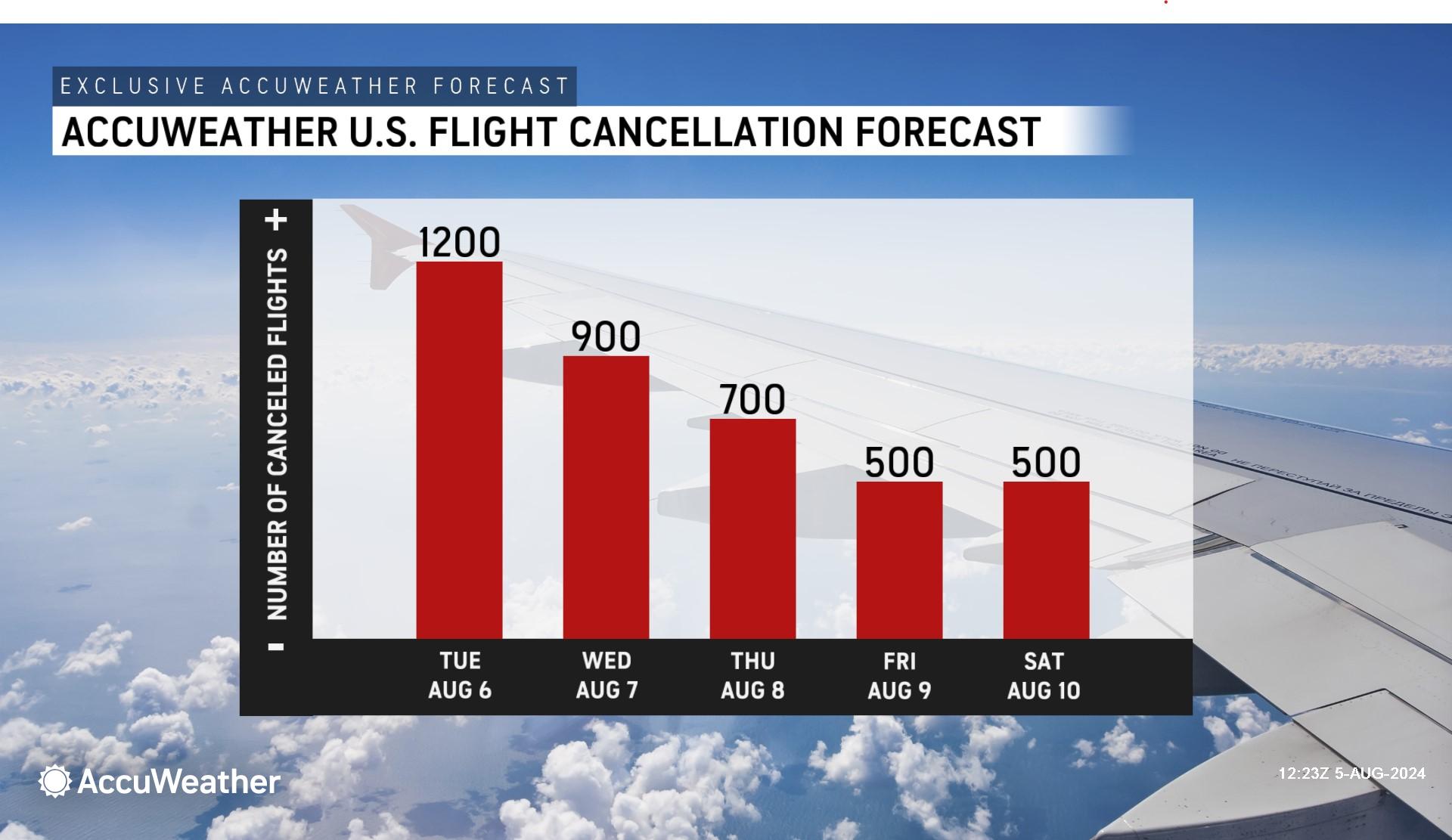
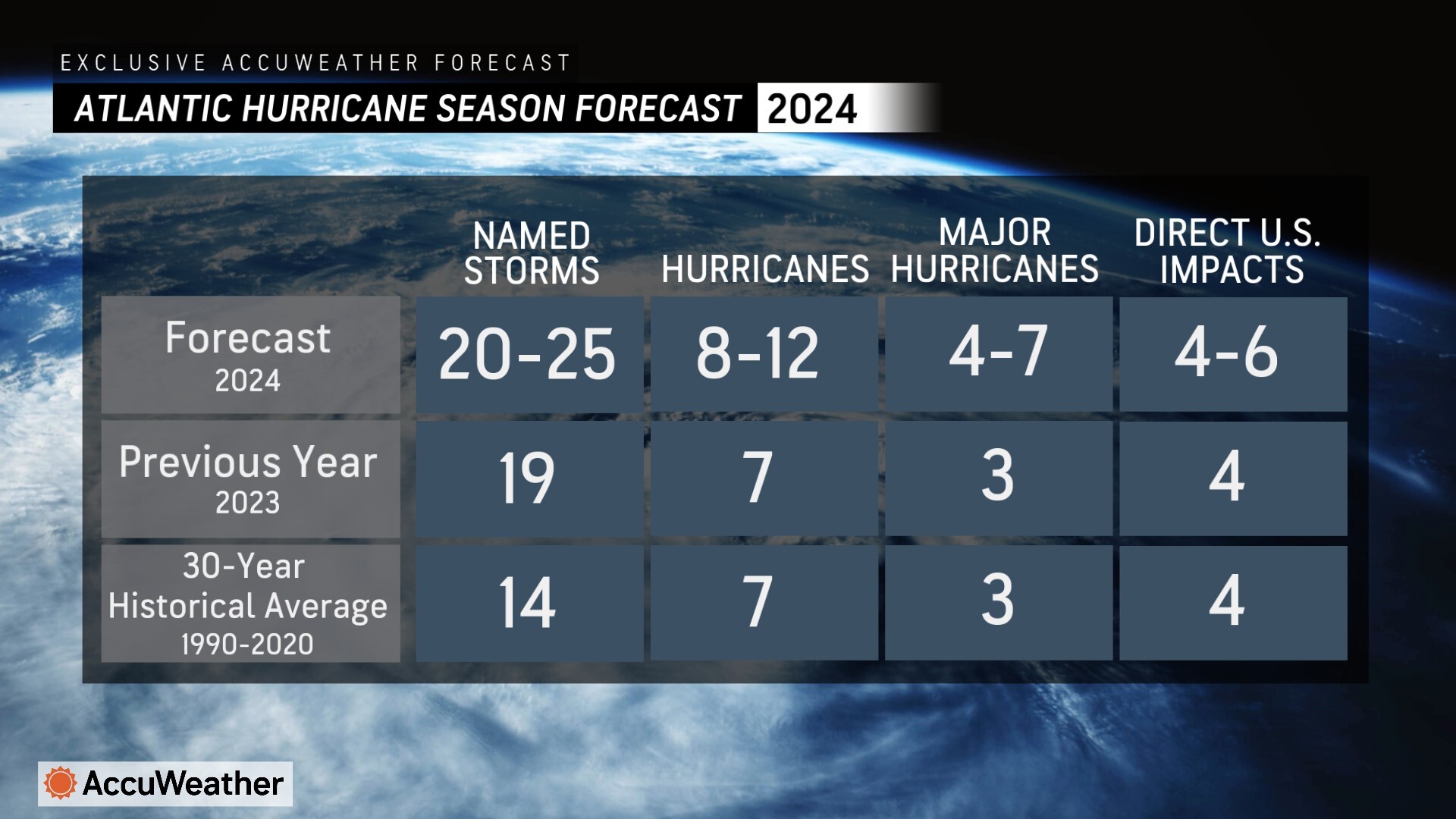
Additional AccuWeather Resources:
Debby to impact Georgia, Carolinas with life-threatening flooding and storm surge this week
AccuWeather Hurricane Tracking & Storm Radar
Hurricane season: AccuWeather's guide for first-timers
How to use a generator safely after a hurricane strikes
AccuWeather Forecasts Explosive 2024 Hurricane Season
Rapidly Intensifying Hurricanes Near Coastline Pose Major Threat To US This Season




